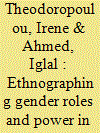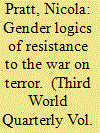| Srl | Item |
| 1 |
ID:
163852


|
|
|
|
|
| Summary/Abstract |
This ethnographic study examines how gender roles associated with male and female Qatari students in intercultural communication courses in a university in Qatar are negotiated between them and their two female instructors from the US and Greece. Our aim is to contribute towards the development of good practice related to the teaching of information exchange among group members who are not culturally alike,1 by arguing that an efficient way of overcoming misunderstandings between instructors and students is to engage in a pedagogical approach, which we call “dialogical infotainment”. This serves the ultimate goal of sharing various types of power in order to sharpen our cultural sensitivity and subsequent tolerance and respect for each other’s gender role-related peculiarities.
|
|
|
|
|
|
|
|
|
|
|
|
|
|
|
|
| 2 |
ID:
116830


|
|
|
|
|
| Publication |
2012.
|
| Summary/Abstract |
This article asks, 'How are femininities constructed in resisting the "war on terror" and with what implications for women's agency and the conceptualisation of gender?' It examines the under-studied gender logics of non-violent resistance to the 'war on terror' by focusing on a series of conferences held in Cairo, between 2002 and 2008, uniting opposition to imperialism, Zionism, neoliberalism and dictatorship. Whereas much feminist scholarship conceptualises sex-gender difference within patriarchy as the major source of women's subordination, women speakers at the Cairo conferences erased patriarchy as a source of subordination and valorised sex-gender difference as a source of agency in resisting the 'war on terror'. Femininities were constructed against the dominant narratives and practices of the war on terror through the representation of national/religious or class differences. These 'resistance femininities' represent strategically essentialised identities that function to bridge differences and mobilise women against the 'war on terror'.
|
|
|
|
|
|
|
|
|
|
|
|
|
|
|
|
| 3 |
ID:
165375


|
|
|
|
|
| Summary/Abstract |
This article explores the gendered experiences and negotiations of Syrian refugee women throughout forced migration processes and the different strategies during family formation that both Turkish men and Syrian women develop in mixed marriages. Its aim is to unravel fluid gendered experiences that are different from ‘reported’ stereotypical stories in the media and ‘constructed’ in the society. By doing so, we argue that the partners’ narratives in these mixed marriages enable us to map the intricate ways in which agency is used and echoed gendered experiences of couples in forced migration and family formation. We conducted in-depth interviews with eight couples voicing different narratives on how they have negotiated with forms of hierarchies, discourses and how they have refined and transformed their refuge. The incorporation of agency into our analysis unpacked (1) heterogeneity of the spouses and their experiences; (2) potential gendered spaces/discourses to be transformed/refined; and (3) nuances of multifaceted impacts of forced migration. Hence, other than macro studies and tantalizing framings in media, this research offers a dynamic reading of gendered experiences to contribute to the growing literature on Syrian refugees.
|
|
|
|
|
|
|
|
|
|
|
|
|
|
|
|